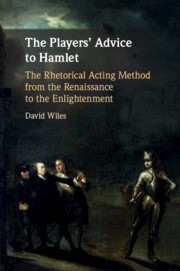 The Players' Advice to Hamlet
The Players' Advice to Hamlet Published online by Cambridge University Press: 16 January 2020
Because there was no equivalent in Renaissance England to the Roman Forum and Senate, the stage actor was free to inherit the mantle of Cicero and Quintilian. I shall ask in this chapter how far stage actors did in practice follow a path mapped out by the ancient orators. Italian accounts of the actor’s art: De Sommi, Cecchini and Scala were Italian stage directors who contested appropriation of the rhetorical tradition by intellectuals, and the improvisatory tradition placed them as makers of embodied speech. Erasmus and the act of speaking: although Erasmus fostered a culture of the book, his sense of language was grounded in orality. Vives offers a vivid account of the fleshiness of the spoken word. A case study from ‘Merchant of Venice’ illustrates how Shakespeare wrote for different rhetorical registers. Sacred rhetoric: Erasmus straddled a tension between the Catholic tradition that emphasized form and the nascent Protestant tradition that required the preacher to be driven by the spirit. Donne and Alleyn: I focus on the relationship between England’s greatest preacher in the early seventeenth century and his son-in-law, who had been England’s greatest stage actor, bringing out the different conceptions of rhetoric.
To save this book to your Kindle, first ensure [email protected] is added to your Approved Personal Document E-mail List under your Personal Document Settings on the Manage Your Content and Devices page of your Amazon account. Then enter the ‘name’ part of your Kindle email address below. Find out more about saving to your Kindle.
Note you can select to save to either the @free.kindle.com or @kindle.com variations. ‘@free.kindle.com’ emails are free but can only be saved to your device when it is connected to wi-fi. ‘@kindle.com’ emails can be delivered even when you are not connected to wi-fi, but note that service fees apply.
Find out more about the Kindle Personal Document Service.
To save content items to your account, please confirm that you agree to abide by our usage policies. If this is the first time you use this feature, you will be asked to authorise Cambridge Core to connect with your account. Find out more about saving content to Dropbox.
To save content items to your account, please confirm that you agree to abide by our usage policies. If this is the first time you use this feature, you will be asked to authorise Cambridge Core to connect with your account. Find out more about saving content to Google Drive.